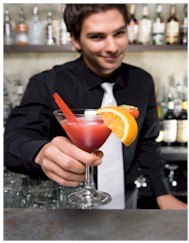 By Brent Allen, Allen Financial Insurance Group
By Brent Allen, Allen Financial Insurance Group
September 6, 2014
There has always been confusion about the need for liquor liability even among insurance professionals. Liquor Liability laws vary greatly by state and insurance policy coverage options can be confusing. Here is some basic information dealing with the subject.
Requests for bartender or alcohol beverage server liability insurance coverage has increased dramatically in recent years. Private functions and venues will often provide alcoholic beverages and hire an outside party to serve them. Frequently the venue or contracting private party will request evidence of insurance including liquor liability coverage. Providing liquor liability coverage for a bartending business has proven to be extremely difficult due to the way this liability exposure is defined and who is actually legally responsible.
The insurance industry has broken down the liquor liability exposure into two categories and coverage:
- Social Host Liquor: Provides protection against bodily injury or property damage suits brought by parties injured as a result of an intoxicated guest who was served alcohol at an event you hosted. Host liquor liability is a coverage that is typically included under the commercial general liability policy for those businesses not ‘in the business of’ serving, manufacturing, distributing, selling, serving or providing alcohol.
- Liquor Legal Liability: Commonly referred to as dram shop liability provides coverage for bodily injury or property damage for which you may become legally liable as a result of contributing to a person’s intoxication. This coverage is provided by a separate policy and will only cover insureds ” in the business of “ manufacturing, selling, distributing, serving alcoholic beverages for charge or no charge if a license is required for the activity. This exposure is not included under the general liability policy.
As a service organization a bartending business does have a business liability exposure and needs to maintain commercial general liability coverage. To determine the liquor liability exposure and who is liable you must first understand the state liquor liability statutes and how they are enforced. Laws vary widely from state to state. Some states do not impose any liability on social hosts *. Others limit liability to injuries that occur on the host’s premises. Some extend the host’s liability to injuries that occur anywhere a guest who has consumed alcohol goes. Many states have laws that pertain specifically to furnishing alcohol to minors. As society has become less tolerant of drunk driving and injuries resulting from the consumption of alcohol and as individuals and organizations concerned with alcohol abuse have taken an active role in the political process, the laws relating to alcohol have generally become more stringent. Common law liability is imposed on those selling alcoholic beverages.
The coverage dilemma faced by bartenders and contracted servers is that they fall between the legal cracks. The liquor legal liability exposure and responsibility falls on the party selling or providing the alcohol. In the dram shop environment this is usually determined by who sells the beverage and holds the liquor license. By this definition the sponsor or host of a private function will be ultimately responsible for the liquor liability exposure. This reality obviously makes the Host extremely uncomfortable as it should. Host liquor coverage is typically acquired from the Sponsor’s commercial general liability policy or possible a special event liability policy specifically obtained for the function.
Given these facts there are only three scenarios to qualify for liquor liability coverage:
- The Insured must be in the business of selling and distributing alcohol.
- The Insured must be the Host providing alcohol to his guests.
- A special event where liquor is not sold but a liquor license permit is required.
In addition to the criteria needed for liquor liability coverage insurance companies have very real concerns about the control of consumption in private party environments. A bar or restaurant exercises complete control over access and consumption to patrons. TIPS trained employees have the ability and duty to cut off a patron who has had too much to drink. This is not necessarily true at a private function such as a wedding or office celebration. Access to alcohol and control of guest consumption is generally beyond the authority of the contracted server.
As with any service organization, private bartending and catering companies need business insurance. You will often be asked for a certificate of insurance or additional insured endorsement by the venue. Liquor liability coverage can only be acquired if you actually sell the alcohol or are added to a special event policy. Joint risk management procedures should be established to monitor guest alcohol consumption and implement TIPS procedures. Determining who is ultimately liability and where liquor liability coverage will be derived from should obviously be on the top of your checklist.
————
* The definition of a Social Host varies from state to state, but generally a social host is one who:
- Furnishes alcohol as an act of hospitality with no motive of pecuniary gain (is not a commercial enterprise, such as a bar or restaurant)
- Has no special relationship, such as an employer, with the guest
- Serves alcohol or condones the consumption of alcohol on property that the host controls. For example, in Massachusetts, simply allowing the consumption of alcohol is sufficient.
Social Host Liability expands the legal responsibility for the consumption of alcohol beyond the person who consumes it to those who furnish it. The intoxicated guest remains liable to persons injured as a result of his actions, but now shares that liability with the host. In many states the social host may also be liable for injuries suffered by the intoxicated guest. Imposing liability on the host reflects the modern view that the provider of alcohol has an obligation to the public to reduce risky behavior by furnishing alcohol safely and responsibly.
For more detailed liquor liability coverage information, premiums and policy quotes please visit https://www.eqgroup.com/liquor-liability .
Allen Financial Insurance Group is a national insurance provider for entertainment, restaurant, bar, tavern and recreational insurance. Established in 1971, our goal was to design and market new and innovative insurance and risk management programs. Our integrated approach to insurance products and services provide greater efficiency and lower premiums for our clients. Find us on the internet a www.eqgroup.com

Recent Comments